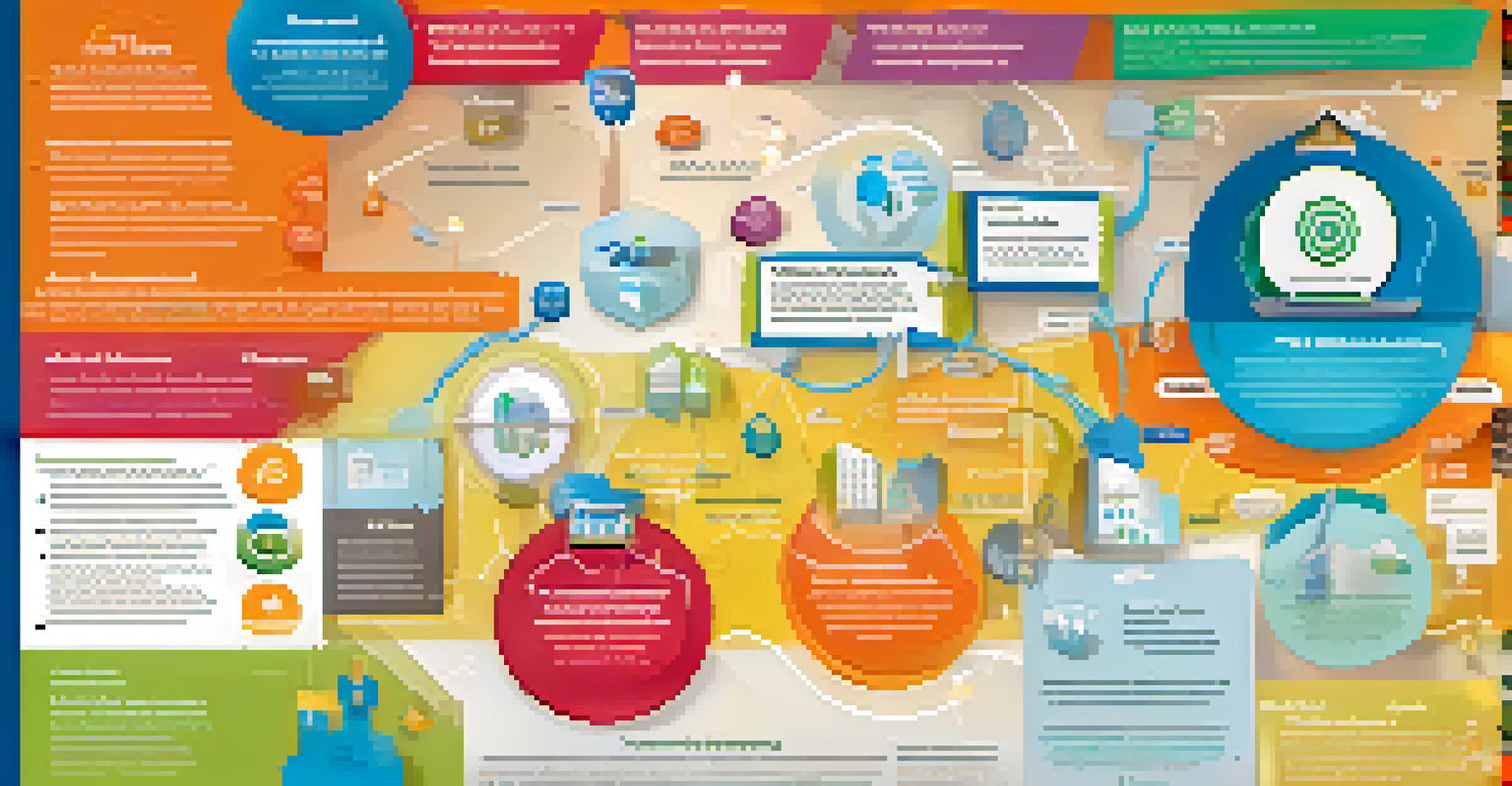The Benefits of Decentralized Insurance for Consumers and Providers

Understanding Decentralized Insurance Basics
Decentralized insurance leverages blockchain technology to provide a transparent and efficient alternative to traditional insurance models. Unlike conventional insurance, where a central authority controls the policies and claims, decentralized insurance allows for peer-to-peer interactions. This shift in paradigm means that consumers can engage directly with one another, fostering a sense of community and trust.
Insurance is a promise, and we must ensure that it is delivered transparently and efficiently to all.
At its core, decentralized insurance aims to eliminate intermediaries, which often lead to higher premiums and slower claims processing. Imagine a world where you can insure your assets without paying hefty fees to an insurance company. Instead, you participate in a collective pool of resources, ensuring that everyone benefits from lower costs and quicker payouts.
As technology continues to evolve, decentralized insurance promises a more inclusive and user-centric approach. By using smart contracts, which are self-executing agreements coded on the blockchain, both consumers and providers can enjoy a streamlined experience that minimizes disputes and enhances transparency.
Cost Efficiency for Consumers
One of the most significant advantages of decentralized insurance is its potential for cost savings. Traditional insurance companies often pass administrative fees onto consumers, but decentralized models reduce these costs by cutting out the middleman. This means you might pay less for the same coverage, which is always a win in any consumer's book.

With lower premiums, consumers can allocate their savings towards other essential expenses or investments. Think of it this way: the money you save on insurance could go toward a family vacation or a new gadget. This financial flexibility is a game changer, especially for those who are budget-conscious.
Cost Savings for Consumers
Decentralized insurance reduces costs by eliminating intermediaries, allowing consumers to save on premiums.
Moreover, the community-driven nature of decentralized insurance allows for more competitive pricing. When consumers band together, they can negotiate better terms and rates, resulting in a win-win situation for all involved. This sense of collective empowerment is something traditional models often lack.
Enhanced Transparency and Trust
Transparency is a key feature of decentralized insurance that significantly benefits consumers. Because all transactions are recorded on an immutable blockchain, participants can easily verify claims and payouts. This level of visibility fosters trust among users, as everyone can see how funds are allocated and used.
Decentralization empowers individuals to take control of their own risk management, fostering community and trust.
In traditional insurance, policyholders often feel in the dark about how their premiums are spent and how claims are processed. Decentralized insurance flips this narrative, making it clear and straightforward. Imagine knowing exactly how your contributions are being utilized and having the ability to track every step of the process.
This transparency not only builds trust but also encourages responsible behavior among participants. When consumers see the direct impact of their contributions, they are more likely to engage positively and minimize fraudulent activities, ultimately creating a healthier ecosystem.
Faster Claims Processing
In the world of insurance, timely claims processing can make all the difference. Traditional systems are often bogged down by red tape and lengthy procedures, leaving consumers frustrated. Decentralized insurance, however, streamlines this process through smart contracts that automate and expedite claims.
When a claim is filed, the smart contract can immediately verify the details against predetermined conditions. This means that payouts can be released instantly, providing consumers with much-needed support during challenging times. Picture being able to access funds right when you need them most, without the usual delays.
Enhanced Transparency Builds Trust
The use of blockchain technology ensures that all transactions are visible, fostering trust among participants.
Faster claims processing not only enhances consumer satisfaction but also improves the overall efficiency of the insurance model. Providers benefit too, as expedited claims reduce administrative burdens and allow them to focus on growth and innovation rather than getting mired in paperwork.
Empowering Consumer Participation
Decentralized insurance puts consumers in the driver's seat, allowing them to actively participate in policy creation and governance. Unlike traditional models, where decisions are made by corporate executives, decentralized systems often involve users in shaping policies and rules. This empowerment leads to a more democratic and tailored insurance experience.
Imagine having a say in the terms of your insurance policy or voting on changes that affect your coverage. This level of involvement not only fosters a sense of ownership but also aligns the interests of consumers and providers. When consumers are engaged, they are more likely to support initiatives that benefit the community as a whole.
This participatory approach also encourages innovation within the insurance space. With diverse voices contributing, decentralized insurance can adapt quickly to emerging needs and trends, ensuring that products remain relevant and valuable to users.
Broader Accessibility for Underinsured Populations
One of the most exciting aspects of decentralized insurance is its potential to reach underinsured and underserved populations. Traditional insurance companies often overlook individuals with limited access or poor credit histories, leaving them without adequate coverage. Decentralized models, however, prioritize inclusivity, offering solutions that cater to diverse needs.
By leveraging technology, decentralized insurance can provide affordable options to those who might otherwise be excluded from the market. For instance, a community-based insurance model could allow local groups to pool resources and support each other, ensuring that everyone has access to essential coverage.
Empowering Consumer Participation
Consumers can actively influence policy creation and governance, leading to a more tailored insurance experience.
This broadened accessibility not only protects vulnerable populations but also helps to stabilize communities. When people feel secure in their coverage, they are more likely to invest in their futures and contribute positively to their neighborhoods.
The Future of Insurance: A Decentralized Approach
As we look ahead, it's clear that decentralized insurance is not just a passing trend; it's the future of the industry. With growing awareness and adoption of blockchain technology, more consumers and providers are likely to embrace this innovative model. The potential for improved efficiency, transparency, and community engagement is simply too compelling to ignore.
Imagine a landscape where insurance is built on trust, collaboration, and shared responsibility. This vision is becoming more achievable as decentralized networks gain traction and prove their efficacy. The shift toward decentralized insurance could lead to an industry transformation that prioritizes consumer needs above all else.

Ultimately, as both consumers and providers recognize the advantages of decentralized insurance, we can expect a more resilient and equitable system. This evolution not only benefits individuals but also has the potential to reshape the way we think about risk management and protection in our lives.